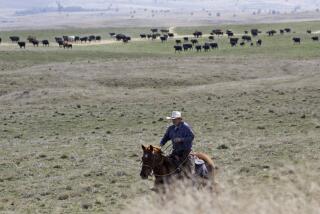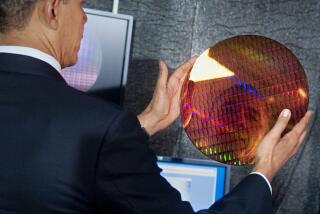Bush, Kerry Take Tax Cut Dispute to Oregon
- Share via
PORTLAND, Ore. — President Bush and his Democratic rival, Sen. John F. Kerry, sparred over tax cuts Friday as both swept across Oregon in their latest simultaneous visit to a campaign battleground. The clash followed the release of a report that found Bush’s tax cuts had led to a decline in the share of federal taxes paid by the richest Americans.
The Democratic presidential nominee, ending his 17-state cross-country trip, seized on the report by the nonpartisan Congressional Budget Office to cast himself as more attuned than Bush to the struggles of the middle class, saying it “documents what others and I have been saying for months.”
“The tax burden of middle-class Americans has gone up, while the tax burden of the wealthiest people has gone down,” Kerry told supporters at picnic tables in a residential cul-de-sac outside Eugene. “That is wrong. That is morally wrong, and it’s wrong from a policy point of view in America, and we have to change it.”
The senator from Massachusetts has proposed new tax reductions for the middle class, but a repeal of the Bush tax cuts for those earning more than $200,000 a year.
Bush did not directly address the congressional report at two Oregon events Friday. But in remarks to supporters in a high school gymnasium outside Portland, he equated raising taxes on the rich with increasing them on small businesses.
“Why would you want to tax the job creators of America?” Bush asked. In general, he said, “everybody who pays taxes ought to get relief. We ought not to play favorites with the tax relief plan.”
White House spokesman Scott McClellan told reporters the wealthy had reaped more savings from Bush’s tax cuts because they paid more taxes to begin with. He also cited substantial tax cuts for middle- and lower-income Americans.
The Bush campaign countered Kerry’s criticism with its own analysis of the congressional report. It said the rich actually paid a slightly bigger share of payroll, excise and corporate taxes that were excluded from the report’s calculations.
The same-day stops in Oregon by Bush and Kerry were the latest demonstration of the precisely defined geography of the presidential race; the White House press plane parked on the Portland airport tarmac alongside Kerry’s campaign charter jet.
For months, Bush and Kerry have darted to the same regions of fewer than two dozen highly competitive states, including Oregon.
Today, Bush plans to campaign in Iowa, where he and Kerry campaigned blocks apart one morning last week.
Oregon, with its seven electoral votes, is a top target of both candidates. In 2000, Bush lost the state to Al Gore by fewer than 7,000 votes, and polls found Kerry running just slightly ahead of Bush in Oregon this year.
Portland independent pollster Tim Hibbitts said Bush’s main challenges in overcoming Kerry’s slim advantage in Oregon and Washington were to curb the violence in Iraq and improve the Pacific Northwest’s economy.
“What people need to believe is some sense of progress, kind of a light at the end of the tunnel,” he said. “If that’s the way they feel in 60 days, he’s got a chance in both states. That’s going to be a tall order.”
Oregon’s 6.9% unemployment rate is the highest in the country, a fact that shadowed the president’s visit.
“Here in the state of Oregon, you’ve been struggling,” Bush told supporters in Beaverton. “After all, your resource industry got hit hard. High-tech got hit hard. The recession hurt.”
He noted that Oregon’s rate had been even worse, peaking at 8.7%. “It’s getting better, but there’s more work to do,” he said.
For Kerry, Oregon was the final stop on a two-week trip across the country by bus, boat, train and plane. The trip across 17 states, aimed at building on momentum from the Democratic National Convention in Boston, concluded with the biggest rally of Kerry’s campaign: roughly 40,000 to 50,000 supporters filled a downtown park on the banks of the Willamette River, with thousands more on a nearby bridge and surrounding streets.
Warming up the crowd were actor Leonardo DiCaprio, who called Kerry a “champion of the environment,” and rock star Jon Bon Jovi, who sang before the senator’s arrival.
Bush’s trip to Oregon was billed by the White House as part official (he announced a $15-million grant for dredging the Columbia River before 300 business leaders at a Portland port terminal) and part political (he fielded questions from 2,000 supporters at Southridge High School in Beaverton).
“This is one of America’s vital waterways,” Bush told the Portland crowd. “It is a key artery of commerce for the Pacific Northwest. I say key artery of commerce -- that means it’s a key for jobs.”
From Portland, Bush traveled to Seattle, where he met with Boeing executives and continued to emphasize his effort to create jobs. He complained about European subsidies for Airbus, Boeing’s rival plane maker, and threatened to bring a suit at the World Trade Organization if they were not ended.
Later, the president attended a $2.4-million fundraiser at the Medina home of businessman Gary Reed.
The Bush campaign also released two television ads on the theme of terrorism on Friday. One faults Kerry for missing Senate Intelligence Committee votes “in the year after the first terrorist attack on the World Trade Center” and for supporting intelligence budget cuts. The other credits Bush for ensuring there were “two fewer terrorist regimes,” referring to Iraq and Afghanistan.
In their debate about Bush’s tax cuts, both Democrats and Republicans said the nonpartisan congressional study released Friday bolstered their positions. But neither side disputed its central finding that Bush’s initiatives provided all income groups with a tax cut.
“The mathematics are clear that for the higher-income individuals, the Bush tax cuts produced lower tax burdens, and as a result, the greater fraction of the tax cuts,” said Douglas Holtz-Eakin, the former Bush White House economist who heads the Congressional Budget Office. “That’s math.”
The share of all federal taxes paid by middle-income Americans rose from 10% in 2001 to 10.5% this year, the report found. But the portion paid by the top one-fifth dropped from 65.3% to 63.5%. And the share paid by the wealthiest 1% dropped from 22.7% to 20.1%.
The tax cuts “have made the tax code more progressive, and taxpayers across the income spectrum will be saddled with higher tax burdens if the tax cuts are not made permanent,” said House Ways and Means Committee Chairman Bill Thomas (R-Bakersfield).
In a Bush campaign conference call with reporters, Thomas accused Kerry of “playing the class warfare card,” and said he expected the Democrat soon to play “the timeworn, dog-eared race card.”
*
Times staff writers Mark Z. Barabak, Susannah Rosenblatt, Warren Vieth and Peter Wallsten contributed to this report. Finnegan reported from Portland, Reynolds from Beaverton, Ore.
More to Read
Get the L.A. Times Politics newsletter
Deeply reported insights into legislation, politics and policy from Sacramento, Washington and beyond. In your inbox twice per week.
You may occasionally receive promotional content from the Los Angeles Times.











